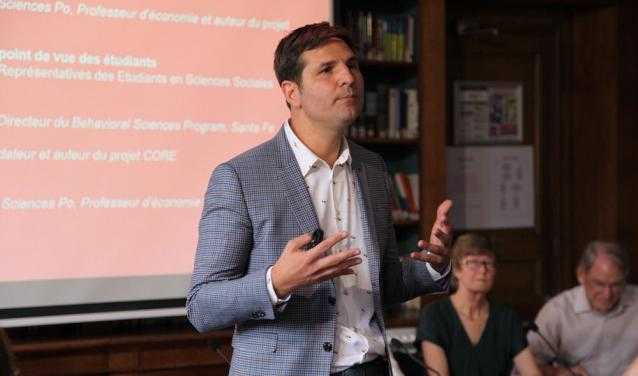Home>CORE: A different way to study economics

31.05.2018
CORE: A different way to study economics
In recent years, students and teachers alike have come to realize that there is an insufficient culture and knowledge of economics in our society. The study of economics and the reality of how our world operates differ enormously. This realization led to the creation of CORE, a new course and manual developed by professors of economics from around the world, including Yann Algan at Sciences Po. The goal of this course: to show that economic tools, often considered too abstract and theoretical, can help solve real-world problems and crises.
"What is the most urgent issue that economists should address?" - "Inequalities!" shout students all around the world when prompted. But there is also climate change, financial instability, unemployment. Faced with these expectations, economics courses disappoint or even divert students from the subject.
"During the 2008 crisis,” explains Wendy Carlin, Professor of Economics and Macroeconomics at UCL and co-author of CORE, “economics students were embarrassed: they went home to celebrate the holidays and when their families asked them for explanations, they were unable to give them any answers."
Too theoretical, too far removed from contemporary issues
It is from this observation that the CORE project was created in 2016 (CORE: Curriculum Open Access Resources in Economics): if citizens of the world are so critical vis-à-vis the economy, it is undoubtedly that the way it is being taught is partially responsible. "The teaching of economics is strongly questioned around the world, and particularly in France, because it is considered too theoretical, too far removed from major contemporary issues, and too reductive on human behavior", explains Yann Algan, Economist and Professor at Sciences Po and one of the authors of the project. CORE, “an open-access platform for anyone who wants to understand the economics of innovation, inequality, environmental sustainability, and more”, is led by a team of researchers and teachers from around the world, and already used in over a hundred universities in the world.
"The greatest resistance to change,” continues Yann Algan, “is the lack of alternatives. To make concrete changes, we needed a tool that could be immediately implemented in the classroom.” That is the objective of the CORE ebook, The Economy, a completely free online manual. The French version has just been published online; students from Sciences Po and the Toulouse School of Economics have been using it since last September.
Teach the economy as if the last 30 years had taken place
To better meet the expectations of students, this new method of teaching economics takes the opposite route of conventional textbooks, based on a simple idea: to study reality. First and foremost, the reality of human beings, who are able to both think of their own self-interest, but also capable of cooperating, and being generous. Oddly enough, this has little or nothing to do with the abstract homo economicus depicted in traditional textbooks. The reality of today's world, which takes into account recent discoveries from economics research, addresses issues related to the environment, economic instability, and inequality. The reality of human and social science is not an isolated object but one that is enriched by the contributions of law, history, sociology. "We cannot understand a company if we ignore the power, politics or social law," notes Samuel Bowles, Arthur Spiegel Research Professor and Director of Behavioral Sciences Program at the Santa Fe Institute, and co-founder and author of CORE. “We have made fundamental changes in how we represent individuals, and how we represent our interactions.”
Thus reinvented, the study of economics turns to search for resolutions of the current problems we face. It does not limit itself to opposing the thinking and theories of the great economists, deemed forever irreconcilable: "We don’t want to juxtapose and compare economists’ views," explains Samuel Bowles. "We do pluralism by integration. We borrow heavily from great economists and create new paradigms."
About CORE: Curriculum Open-access Resources in Economics
CORE-based courses have already been taught as a general introduction to economics in more than 100 universities around the world. Since its launch in 2016, more than 60,500 users in 186 countries and more than 6,100 teachers in 131 countries have used CORE. The paper version of the English eBook has already been reissued six times to reflect demand. Translations into Farsi, Italian, Spanish, Portuguese, as well as an adaptation for Southeast Asia are in preparation. An enriched website was launched in September 2017 and a new project adapted to an audience of non-specialists in economics was recently developed by 20 universities.
More information